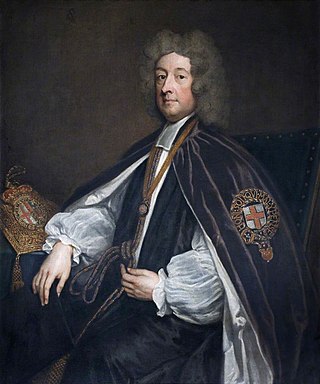Related Research Articles

Roger Bacon, OFM, also known by the scholastic accolade Doctor Mirabilis, was a medieval English philosopher and Franciscan friar who placed considerable emphasis on the study of nature through empiricism. In the early modern era, he was regarded as a wizard and particularly famed for the story of his mechanical or necromantic brazen head. He is sometimes credited as one of the earliest European advocates of the modern scientific method, along with his teacher Robert Grosseteste. Bacon applied the empirical method of Ibn al-Haytham (Alhazen) to observations in texts attributed to Aristotle. Bacon discovered the importance of empirical testing when the results he obtained were different from those that would have been predicted by Aristotle.

Claude Fleury, was a French priest, jurist, and ecclesiastical historian.
Annates were a payment from the recipient of an ecclesiastical benefice to the collating authorities. Eventually, they consisted of half or the whole of the first year's profits of a benefice; after the appropriation of the right of collation by the Roman see, they were paid to the papal treasury, ostensibly as a proffered contribution to the church. They were also known as the "first fruits", a religious offering which dates back to earlier Greek, Roman, and Hebrew religions.
Queen Anne's Bounty was a scheme established in 1704 to augment the incomes of the poorer clergy of the Church of England, and by extension the organisation which administered the bounty.

William Talbot was an English Anglican bishop. He was Bishop of Oxford from 1699 to 1715, Bishop of Salisbury from 1715 to 1722 and Bishop of Durham from 1722 to 1730.

White Kennett was an English bishop and antiquarian. He was educated at Westminster School and at St Edmund Hall, Oxford, where, while an undergraduate, he published several translations of Latin works, including Erasmus' In Praise of Folly.
Edward Talley was a Welsh Anglican priest in the late 16th and early 17th centuries.
First Fruits and Tenths was a form of tax on clergy taking up a benefice or ecclesiastical position in Great Britain. The Court of First Fruits and Tenths was established in 1540 to collect from clerical benefices certain moneys that had previously been sent to Rome.
John Bacon F.S.A. (1738–1816), was a British clerk and editor, who edited a revised edition of John Ecton's Thesaurus. He spent much of his working life in the first-fruits department of the office Queen Anne's Bounty in the Temple, London.
Brampton Gurdon was an English clergyman and academic, Boyle lecturer in 1721.
Henry Dison Gabell, D.D. (1764–1831), was head-master of Winchester College.
Thomas Bowers (1660–1724) was an Anglican bishop of Chichester. The son of Mr. Richard Bowers, a draper of Shrewsbury, he was educated at Shrewsbury School and St. John's College, Cambridge.

John Davies (1679–1732) was an English cleric and academic, known as a classical scholar, and President of Queens' College, Cambridge from 1717.
Edward Cobden, D.D. (1684-1764) was a British divine, poet, and Archdeacon of London, from 1742–1764.
John Philpot was an Archdeacon of Winchester and an English Protestant martyr whose story is recorded in Foxe's Book of Martyrs. He was the third son of Sir Peter Philpot and was born at Compton, Hampshire, in 1516.
Revd John Trusler (1735–1820) was an eccentric English divine, literary compiler, and medical empiric.
Edward Cresset was an 18th-century Anglican churchman.
Cutts Barton (1706–1780) D.D. was an English cleric, Dean of Bristol from 1763 to 1780.
Richard Langford was a Welsh Anglican priest in the late 17th and early 18th centuries.

John Savage (1673–1747) was an English Anglican clergyman and author.
References
![]() This article incorporates text from a publication now in the public domain : "Ecton, John". Dictionary of National Biography . London: Smith, Elder & Co. 1885–1900.
This article incorporates text from a publication now in the public domain : "Ecton, John". Dictionary of National Biography . London: Smith, Elder & Co. 1885–1900.